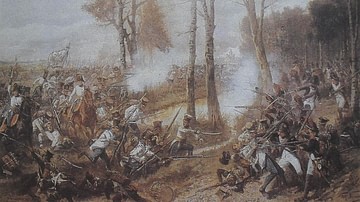Search
Search Results

Definition
The Crisis of the Third Century - A Pivotal Era of Ancient Rome
The Crisis of the Third Century (also known as the Imperial Crisis, 235-284) was the period in the history of the Roman Empire during which it splintered into three separate political entities: the Gallic Empire, the Roman Empire, and the...

Definition
Avars
The Avars were a confederation of heterogeneous (diverse or varied) people consisting of Rouran, Hephthalites, and Turkic-Oghuric races who migrated to the region of the Pontic Grass Steppe (an area corresponding to modern-day Ukraine, Russia...

Article
Achaemenid Kings List & Commentary
The Achaemenid Empire (c. 550-330 BCE) was the first great Persian political entity in Western and Central Asia which stretched, at its peak, from Asia Minor to the Indus Valley and Mesopotamia through Egypt. It was founded by Cyrus II (the...

Definition
Yazdegerd III
Yazdegerd III (r. 632-651) was the last monarch of the Sassanian Empire (224-651), ruling – or attempting to rule – amidst the chaos of its final decline and fall to the invading Muslim Arabs. He was the son of the prince Shahriyar (d. 628...

Article
The Isaurians and the End of Germanic Influence in Byzantium
Germanic influence reigned in the Roman Empire from the end of the 4th century CE through the 5th. Germanic individuals took important posts in the government and the military, and Germanic tribes penetrated ever further into lands that had...

Collection
Battles of the Roman Empire
The Roman Empire was forged through warfare and in this collection we look at some of the key battles and revolts that shaped its borders from the reign of Augustus onwards. We look at Varus' shocking defeat at the Battle of Teutoburg Forest...

Definition
Sargon of Akkad
Sargon of Akkad (r. 2334 - 2279 BCE) was the king of the Akkadian Empire of Mesopotamia, the first multi-national empire in history, who united the disparate kingdoms of the region under a central authority. He is equally famous today as...

Image
The Hungarian National Museum
The Hungarian National Museum, Budapest, opened in 1802 CE.

Image
Charge of the 19th Hungarian Infantry Regiment Against the French at Leipzig
Chrage of the 19th Hungarian Infantry Regiment against French troops, part of the Battle of Leipzig (16-19 October 1813). By Fritz Neumann, 19th century.

Definition
Mesopotamian Government - Helping and Serving the Gods
Ancient Mesopotamian government was based on the understanding that human beings were created to help and serve the gods. The high priest, king, assembly of elders, governors, and any other officials were recognized as stewards chosen by...